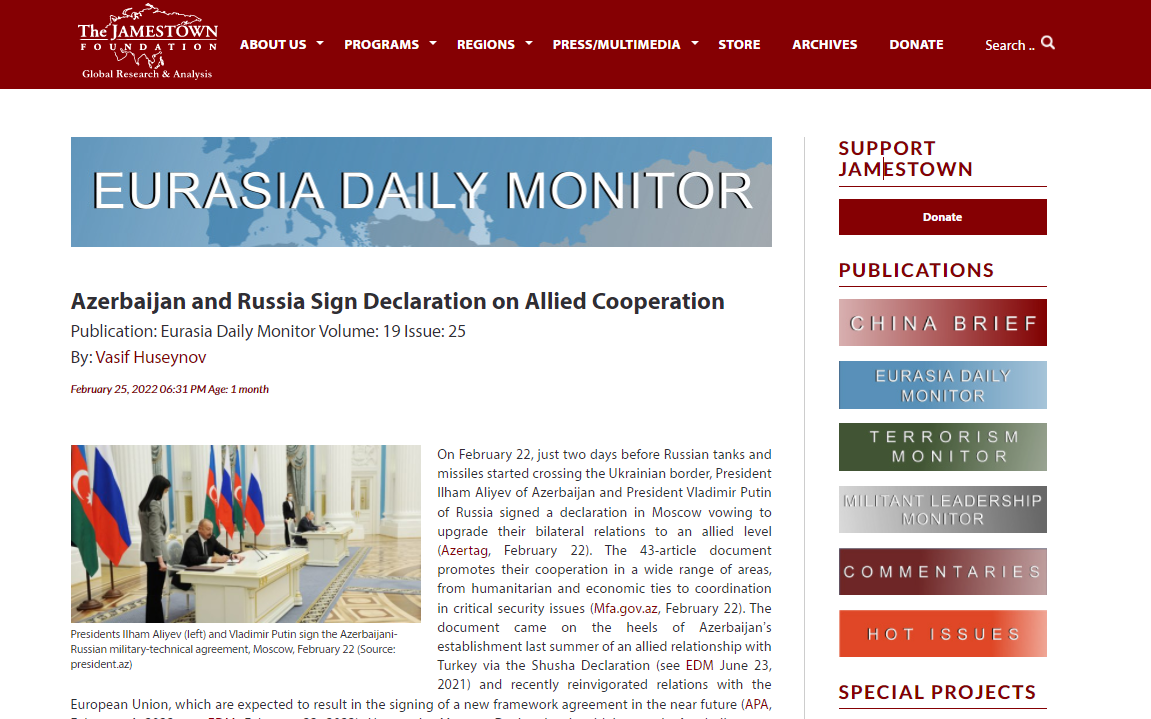On February 22, just two days before Russian tanks and missiles started crossing the Ukrainian border, President Ilham Aliyev of Azerbaijan and President Vladimir Putin of Russia signed a declaration in Moscow vowing to upgrade their bilateral relations to an allied level (Azertag, February 22). The 43-article document promotes their cooperation in a wide range of areas, from humanitarian and economic ties to coordination in critical security issues (Mfa.gov.az, February 22). The document came on the heels of Azerbaijan’s establishment last summer of an allied relationship with Turkey via the Shusha Declaration (see EDM June 23, 2021) and recently reinvigorated relations with the European Union, which are expected to result in the signing of a new framework agreement in the near future (APA, February 4, 2022; see EDM, February 23, 2022). Hence, the Moscow Declaration is widely seen in Azerbaijan as a delicate balancing act to maintain relations with Russia at a friendly level—which is increasingly important against the backdrop of war in the former Soviet space.
Amidst Aliyev’s visit to Moscow, some Azerbaijani experts argued that the signed Russo-Azerbaijani declaration is a reassurance that Russia will not “pursue similar policies toward Azerbaijan [as Russia has carried out against Georgia and Ukraine] in exchange for Azerbaijan recognizing Russia as a dominant power in the broader former Soviet region” (Twitter.com/AzStudies/, February 22). This is critical for a number of reasons, but primarily because of the lack of any capable balancing power that would dare to openly and militarily confront Russia in the case of a challenging security situation that might involve Azerbaijan—as the experience of Ukraine and Georgia regretfully demonstrates. The document is also seen by some Azerbaijani observers as an assurance that the trilateral (Azerbaijan, Armenia, Russia) declarations of November 10, 2020, January 11, 2021, and November 26, 2021, will enjoy further support from Moscow (Report.az, February 23).
In his press conference with President Putin following the signing of the declaration, President Aliyev was careful to read out the first article of the document, which among other issues, stresses mutual respect for the respective sides’ independence, sovereignty, and non-interference in the other’s internal affairs (Azertag, February 22). This article was widely discussed by many Azerbaijani observers, who consider it an assurance against any attempts to undermine the country’s costly regained independence and sovereignty in the early 1990s (Report.az, February 23).
According to the Moscow declaration, Azerbaijan and Russia express readiness to hold the same or similar positions on issues of international relations as well as to maintain cooperative relations to ensure stability and security in the Caucasus and Caspian regions. In another security dimension of the document, the sides agree to hold urgent consultations to resolve any situation that may threaten peace, violate the peace or affect the security interests of one of the sides. They plan also to establish a permanent consultation mechanism between the two countries’ foreign ministries to avoid actions that might undermine their strategic and allied relationship.
The Moscow declaration brings about novelties to Russian-Azerbaijani relations in the military sphere. Until now, the military cooperation between the two sides was largely limited to Azerbaijan’s purchase of Russian weapons, besides some other minor issues; but the latest declaration elevates this cooperation to a much higher level. This includes joint operations involving their armed forces, joint combat training, the establishment of service centers for the maintenance, repair and modernization of Azerbaijan’s weapons and military equipment, as well as the organization of joint production of various types of military products. The sides may also provide military assistance to each other on the basis of the United Nations Charter and other international agreements.
The declaration covers the economic aspects of Russian-Azerbaijani relations as well. Vowing to take various initiatives to promote their bilateral economic bonds, the two sides promise to refrain from carrying out any economic activity that directly or indirectly harms the interests of the other side. One major novelty in this direction is the promise to use national currencies in mutual settlements and to facilitate the compatibility of their payment systems, including the joint service of bank cards.
In Moscow, Russia and Azerbaijan also agreed to deepen cooperation in the energy sphere, including exploration and refining of oil and natural gas fields, the transportation of energy resources, including the development of infrastructure projects, as well as alternative and renewable energy sources and energy efficiency. This declaration brings about a new area of cooperation in this sector: the sides agree to consider opportunities for developing cooperation in the field of nuclear energy. Retrospectively, Russia proposed to build a nuclear power plant in Azerbaijan in 2019, but the topic had not been on the agenda since then (see EDM, October 22, 2019). The Moscow declaration hints that the sides may discuss this prospect more intensely in the future.
Finally, according to the Moscow declaration, Azerbaijan and Russia will cooperate in information security, mass communication, public health, humanitarian, agricultural, public diplomacy, cultural and other areas, and they will support each other in international forums as well as promote inter-parliamentary cooperation. In general, the document, which builds on previous interstate agreements between Russia and Azerbaijan, is notable for how extensive it is; thus, the February 22 agreement will likely shape relations between the two countries for years to come.
https://jamestown.org/program/azerbaijan-and-russia-sign-declaration-on-allied-cooperation/








